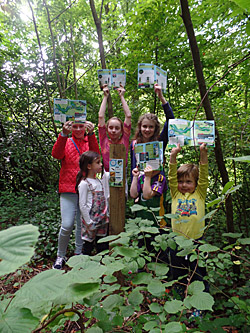Summary
Summary

Grow Wild is Kew Botanic Garden’s flagship outreach programme involving communities, young people and volunteers in the transformation of local spaces using native wildflowers and fungi. The purpose of the Grow Wild evaluation undertaken by Forest Research is to assess the impact on the people participating in the different Grow Wild activities, namely:
- The mass distribution of packets of wild flower seed and fungus kits
- Community-based wildflower growing projects
- Projects for and run by young people, including arts-focused initiatives
- Grow Wild mentor volunteering scheme
The evaluation investigated the kind of activities that the Grow Wild programme facilitated, the type of people that took part, what if any wellbeing impacts there were and whether there were any behaviour change outcomes at individual or community level.
Research objectives
The specific research objectives were to:
- Assess the impacts of the Grow Wild programme using NEF’s five ways to wellbeing framework
- Evaluate the programme’s impact on target beneficiaries, i.e. young people aged between 12-25, and those not previously engaged in environmental and community based activity
- Identify the relative effectiveness of the different programme activities generating wellbeing impacts
- Interpret the outcomes of the Grow Wild programme using insights from Social Learning Theory of behaviour change
Results so far
The project collected data in two different periods, and across different Grow Wild activities in Scotland, England, Wales and Northern Ireland as follows:
During evaluation period 2014-2016
- Impacts of individual seed packets: On-line survey, 63,271 responses from individuals
- Impacts of seed kits: On-line survey, 6,811 responses from leaders of community groups
- Impacts of Community projects and Flagship projects: case-studies of 25 projects, including 102 discussions & interviews with c.240 participants
During evaluation period 2016-17
- Impacts of new seed and fungus kits: On-line survey, c.480 responses from leaders of community groups and schools
- Impacts of youth projects: Event/site visit, focus group discussions, Most Significant Change scoring with 30 young people
- Impacts of community projects: Case-studies of 4 projects, including group discussions and Most Significant Change scoring with 17 participants and leaders
- Impacts of Mentor volunteering scheme: Before and after assessment of Most Significant Changes with 53 volunteer Mentors
Analysis of data collected during 2016-17 is ongoing. Results from the 2014-2016 Grow Wild projects indicate that as a consequence of Grow Wild:
- Individuals and communities contributed to enduring improvements to local environmental quality and to natural assets in their neighbourhoods.
- Participants in Grow Wild activities were motivated to go on and do other things for their communities, including helping their neighbours and volunteering for local organisations
- Increased understanding of nature brought about by taking part in Grow Wild led to enduring connections to nature and behaviour change which included:
- getting out into the outdoors more often
- visiting new and unfamiliar green spaces
- more tolerance and relaxed attitudes towards interaction with nature
- picking up litter, and looking after natural spaces
- protecting and campaigning for wildlife locally and with other organisations
- Some of the wellbeing impacts on target groups of young people, those not engaged with nature, and those from areas of higher deprivation were greater than for other participants
- Young people not only learnt about nature, but also about the value of investing time in a specific site and returns to effort, which contributed to a sense of connection, ownership and responsibility to natural places.
Publications
A series of short video’s in which community project participants explain the impact of their Grow Wild experiences can be found here on the Grow Wild YouTube channel.
Ambrose-Oji, B and Forster, J., 2017, Grow Wild Evaluation Technical Report Vol I Seed Packets and Kits 2014-16, Forest Research report to Grow Wild, Royal Botanic Garden, Kew, Richmond Surrey pp. 82
Ambrose-Oji, B and O’Brien, L, 2017, Grow Wild Evaluation Technical Report Vol II Community and Flagship Projects 2014-16, Forest Research report to Grow Wild, Royal Botanic Garden, Kew, Richmond Surrey pp. 84
Sowing the seeds of a movement: building nature connection through wild horticulture. Bianca Ambrose-Oji, Jack Forester, Liz O’Brien, Philip Turvil, Julia Willison. Presentation at national conference “Nature Connections: Beyond contact with nature to connection” Derby University, June 27th 2017.
Status
The project started in February 2015 and was completed in November 2017.
Contact
Related Products/Services
The social researchers at Forest Research offer project and programme evaluation consultancy services to a wide range of customers working in the forestry, land-based and conservation management sector
Funders and partners
This project is a contracted service for Royal Botanic Gardens Kew.
Forestry Commission policy
Even though this research is not focused on woodland, it builds evidence which contributes to understanding of areas that are mentioned as of concern within the Science and Innovation Strategy for Forestry in Great Britain and the DEFRA forest policy statement for England
These include methods which increase community involvement in the care and management of natural capital, and the potential for urban green spaces to provide cultural ecosystem services that support community and individual wellbeing.
